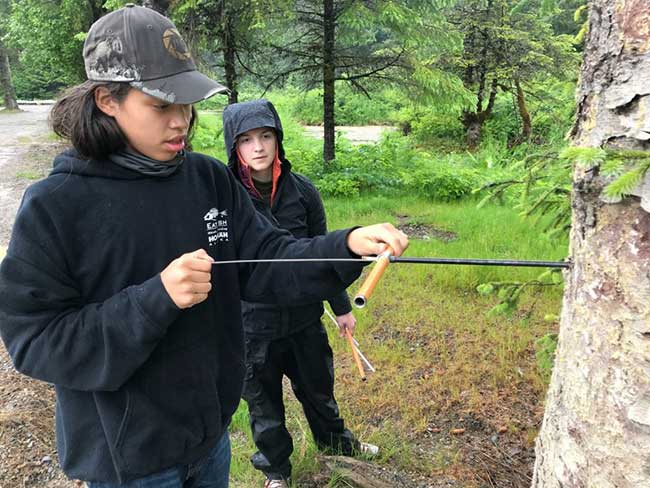
NSF grant supports Wooster team’s climate change research in Alaska

The National Science Foundation (NSF) awarded a three-year grant in February to a College of Wooster team researching climate change through analyzing tree rings of wood samples salvaged from melting Alaskan glaciers.
The team working on the project currently includes principal investigator Greg Wiles, the Schoolroy Chair of Natural Resources and professor of earth sciences; Nick Wiesenberg, a geology technician at the College; Wooster students, and researchers at the University of Alaska Fairbanks. The NSF grant supports the work of students and the investigators along with travel to remote field sites along Alaska’s glaciated outer coast.
The team has a collection of approximately 1,000 samples of wood salvaged from glaciers in Alaska that allow them to record annual temperature change over thousands of years and gain insight into climate change. “Every year the tree puts on a ring and the size of that ring is a function of temperature,” Wiles explained. “We can use those tree rings to go back in time and see what temperatures were like 1,000 or 2,000 years ago.”
This allows the researchers to track the general warming of the climate as well as anticipate changes in the future. “Those changes that we have seen in the past and that we anticipate in the future are relevant to resource management,” Wiles said, explaining that the health of important economic resources like forests and salmon, for example, are effected by changes in climate.
The Alaskan project is one of many conducted by The College of Wooster tree ring lab, which Wiles directs in the earth sciences department. “The work is a continuation of projects that we have been involved with over 20 years at Wooster,” Wiles said. “The work of salvaging tree-ring records in the wake of retreating glaciers becomes more vital each year as these archives of past temperatures are washed out to sea or become obscured by the dense vegetation of the coastal temperature rainforests.”
Working out of the tree ring lab, Wooster students have the chance to incorporate data from Alaska into their own research projects. This year for their senior Independent Study projects, Claire Cerne ’21 is exploring how the tree-ring research can be relevant to park management and the histories of the Tlingit, a native population in southeast Alaska, and Julia Pearson ’21 is examining the influence of a glacier on microclimate and forests. There was also an Applied Methods and Research Experience (AMRE) group this past summer that used data from Alaska in their work. “All of these students are presenting at December’s American Geophysical Union Annual Meeting,” Wiles said.
Due to coronavirus restrictions this year, the team adjusted their research methods. “This is the first year in over 20 that we were not able to bring students to Alaska,” Wiles said. Instead, they worked remotely with Tlingit students in Hoonah, a village in Alaska, who sent samples from trees back to the Wooster team to analyze. Since the NSF grant is for three years, Wiles plans to use the remaining funds to return to Alaska with a group of students to continue their research and work with Tlingit students. “We will be traveling to Hoonah to work more closely with that group and others in coastal Alaska who are seeking to learn more about their environment as well as new skills that might lead to careers in resource management and conservation,” he said.
Above: Tlingit students in Hoonah, a village in Alaska, collect samples from trees earlier this spring to send back to the Wooster team to analyze.
Posted in News on September 22, 2020.
Related Posts
Related Areas of Study
Earth Sciences
Geology, environmental geoscience, geophysics, and other classes that explore Earth and the impact of humans
MinorGeology
Start research in your first year and graduate with a strong foundation in the Earth Sciences.
Major Minor

